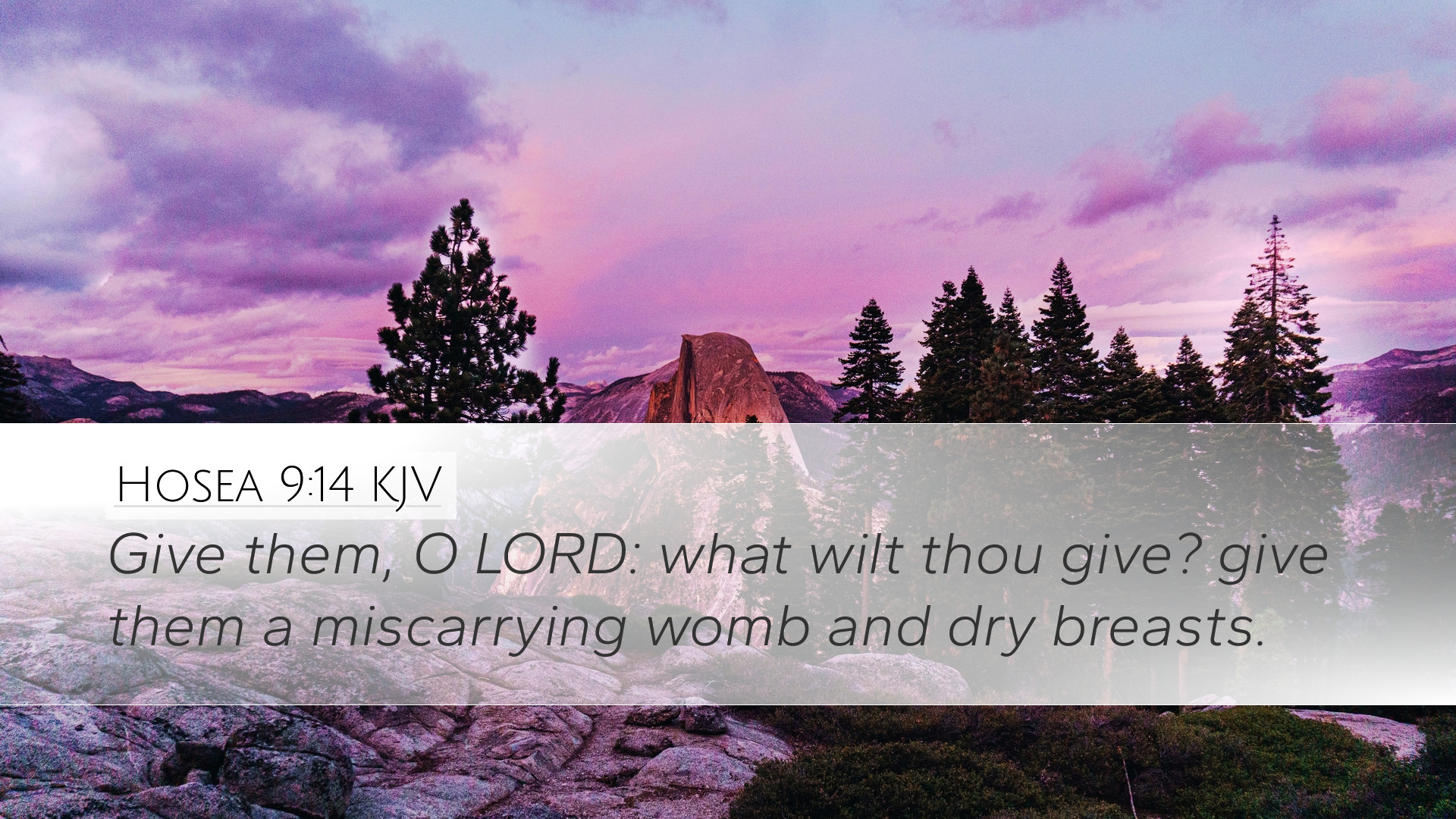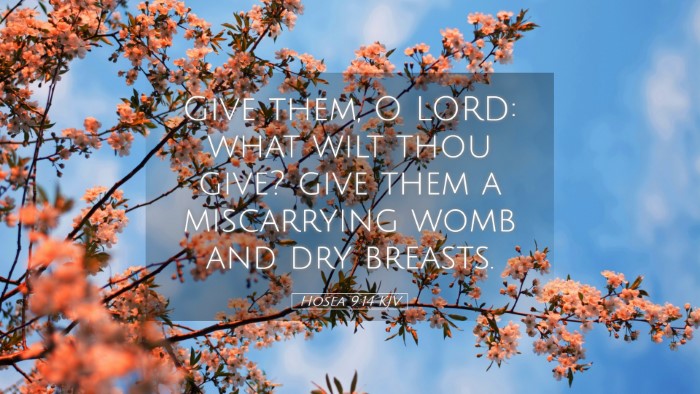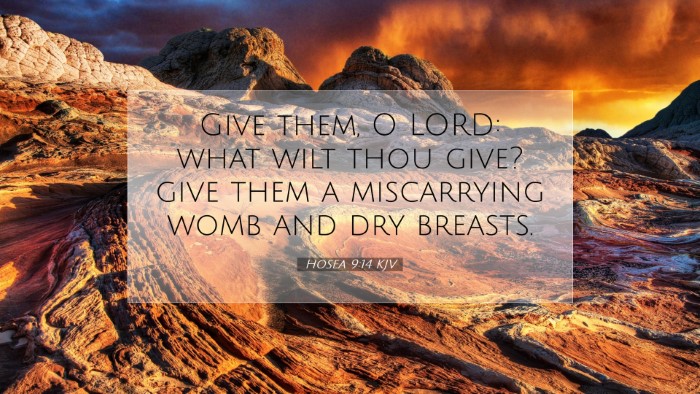Old Testament
Genesis Exodus Leviticus Numbers Deuteronomy Joshua Judges Ruth 1 Samuel 2 Samuel 1 Kings 2 Kings 1 Chronicles 2 Chronicles Ezra Nehemiah Esther Job Psalms Proverbs Ecclesiastes Song of Solomon Isaiah Jeremiah Lamentations Ezekiel Daniel Hosea Joel Amos Obadiah Jonah Micah Nahum Habakkuk Zephaniah Haggai Zechariah MalachiHosea 9:14
Hosea 9:14 KJV
Give them, O LORD: what wilt thou give? give them a miscarrying womb and dry breasts.
Hosea 9:14 Bible Commentary
Commentary on Hosea 9:14
Hosea 9:14 (KJV): "Give them, O Lord: what wilt thou give? give them a miscarrying womb and dry breasts."
This verse from the book of Hosea encapsulates a complex interplay of judgment and divine will, serving as a sobering reflection on the consequences of societal sin and the profound loss of spiritual vitality.
Contextual Background
The Book of Hosea, attributed to the prophet Hosea, is a crucial text in the prophetic tradition, addressing the northern kingdom of Israel during a time of moral decay and rampant idolatry. Hosea's messages convey both God's deep anguish over Israel's unfaithfulness and His unwavering commitment to justice.
Historical Setting
During Hosea's ministry, Israel was characterized by pervasive sin and a turn away from Yahweh. The worship of Baal and other pagan deities led to moral decay, and the nation faced imminent consequences. The verse under consideration reflects Hosea’s lament for the nation’s plight and God’s response to their widespread abandonment of covenant fidelity.
Exegetical Insights
This particular verse conveys a stark declaration of divine retribution, and it deserves examination through various perspectives:
The Cry for Judgment
Hosea's call, "Give them, O Lord: what wilt thou give?" can be understood as a poignant rhetorical question. Matthew Henry elucidates this statement by noting that it expresses a recognition of the grievous consequences facing Israel—the impending loss of blessings due to unfaithfulness. The refrain emphasizes the nature of divine judgment as not simply punitive but as a profound retraction of the blessings once readily bestowed.
The Significance of a Miscarrying Womb and Dry Breasts
The imagery of a "miscarrying womb" and "dry breasts" evokes powerful symbolism regarding the loss of fruitfulness. Albert Barnes comments that these metaphors articulate the futility and desperation resulting from divine judgment. In ancient Israelite society, fertility was a significant marker of divine favor, prosperity, and familial blessing. The loss of these attributes signifies a withdrawal of God's presence and protection.
Spiritual Implications
Adam Clarke reflects on the spiritual implications of such a judgment, emphasizing that God's withdrawal leads to a barrenness not only in physical terms but also spiritually. The empty womb and lack of nourishment reflect a spiritual destitution that parallels Israel’s abandonment of Yahweh, portraying a stark image of their spiritual crisis. This barrenness serves as a metaphor for the church and individuals, warning against the consequences of turning away from God's covenant.
Theological Reflections
The implications of Hosea 9:14 extend beyond the historical context into profound theological reflections on God's nature and human response:
God's Sovereignty and Justice
This passage illustrates the tension between God's mercy and justice. Hosea's lament resonates with the theme of divine sovereignty in executing judgment and the imperative response of repentance from a wayward people. As Matthew Henry highlights, God's justice often requires severe measures to awaken a deeply rooted sinfulness; hence, the stark pronouncement is a call to seriousness in receiving God's correction.
The Role of Repentance
In the broader theological narrative, the call to repentance remains a central theme. The consequences described in this passage serve as a stark reminder for believers to remain vigilant in their faithfulness to God. This mirrors the New Testament's emphasis on repentance, where transformation leads to renewal and ultimately, restoration. The call for a renewed commitment is not only for the individual but for the entirety of God’s people, urging collective accountability and response.
Faith and Application
For pastors, students, and theologians, the message of Hosea 9:14 resonates as a pressing call to examine the spiritual health and vitality of the community of faith:
- Analyzing Spiritual Fruitfulness: The imagery challenges individuals and churches to assess their spiritual fruitfulness. Are we nurturing a relationship with God that leads to genuine growth, or have we succumbed to spiritual barrenness?
- Embracing Corrective Discipline: Emphasizing the necessity of viewing God’s judgments through the lens of correction rather than mere punishment encourages a posture of humility and reception of God's discipline.
- Urging Corporate Repentance: The example of Israel's collective sin underscores the importance of corporate confession and the role of community in returning to faithfulness.
Conclusion
The succinct yet poignant words of Hosea 9:14 invoke a significant theological reflection on divine judgment and the consequences of spiritual unfaithfulness. The metaphors of barrenness serve as powerful images that speak to the heart of God's people. As citizens of a faith community, the imperative to respond to God's call remains ever relevant, demanding both individual reflection and corporate action guided by the Spirit toward renewal and fruitfulness in Christ.


